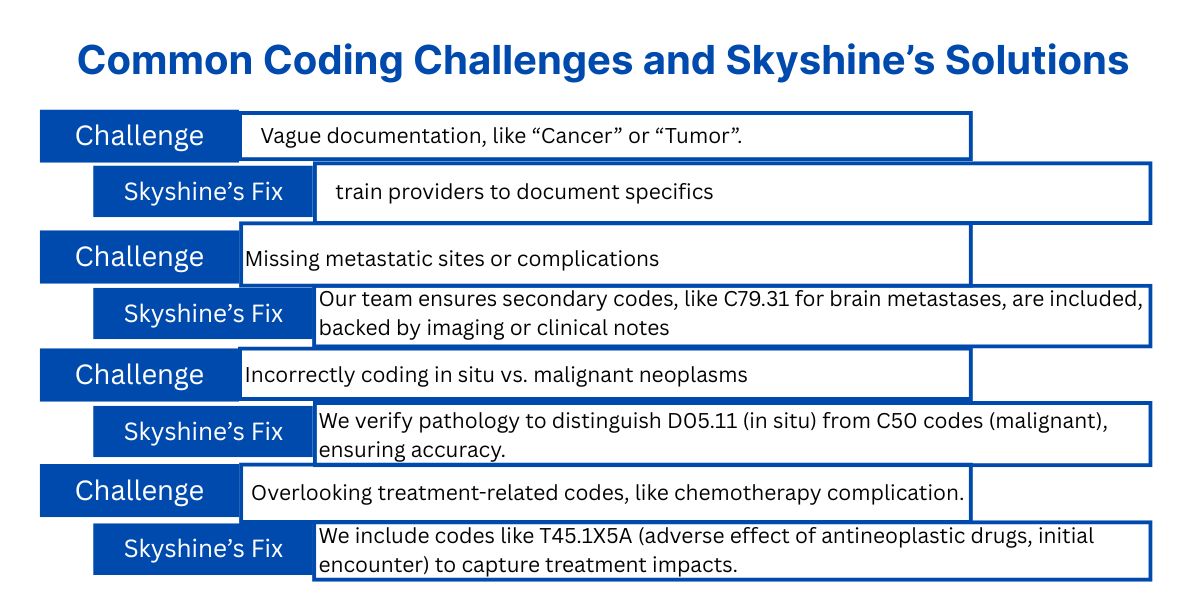
ICD-10 Coding for Musculoskeletal Disorders
September 8, 2025
Medical Billing for Behavioral Health
September 22, 2025At Skyshine Health Solutions, we understand that ICD-10 coding for oncology is a cornerstone of effective medical billing services. Cancer diagnoses, covered in the C00-D49 chapter, are complex, requiring precision to ensure seamless medical claims processing and optimized healthcare revenue cycle management. Coding errors can lead to claim denials, delayed payments, or compliance issues, costing practices significant time and revenue. Our healthcare billing solutions empower oncology providers to master ICD-10 coding, ensuring compliance with CMS and HIPAA regulations while maximizing reimbursements. This comprehensive guide explores why oncology coding matters, breaks down key codes, shares expert tips, and shows how Skyshine streamlines medical coding and billing for oncology practices.
Why Oncology Coding Matters
Oncology coding is uniquely challenging due to the diversity of cancer types, stages, and treatment protocols. Accurate medical coding and billing ensures claims are processed correctly, securing timely reimbursements and supporting patient care. According to a 2023 Healthcare Financial Management Association study, 60% of claim denials stem from coding or eligibility errors, with 80% preventable through proper documentation. Coding mistakes can delay treatments, like chemotherapy or radiation, and erode patient trust with unexpected bills. Skyshine’s medical billing services prevent these issues by ensuring codes align with pathology reports, payer requirements, and clinical details.
Beyond financials, precise coding enhances care coordination. For example, coding a specific lung cancer diagnosis ensures oncologists and radiologists align on treatment plans, improving outcomes. It also supports cancer research by providing accurate data for registries and public health studies. Skyshine’s healthcare billing solutions reduce administrative burdens, letting providers focus on patients while we handle the complexities of healthcare revenue cycle management.
Understanding the ICD-10 C00-D49 Chapter
The ICD-10-CM C00-D49 chapter covers neoplasms, including malignant, benign, and in situ tumors. Oncology coding requires specificity in documenting the cancer’s site, laterality (left or right), histological type, and metastatic status. Vague or incomplete documentation risks claim denials, costing practices an average of $117 per denied claim in rework, per the American Medical Association. Skyshine’s medical billing services help providers avoid these pitfalls by ensuring documentation meets CMS standards, supporting accurate medical claims processing.
Key ICD-10 Codes for Oncology
Here’s a detailed look at essential codes for common cancers, with tips to ensure precision:
1. Lung Cancer (C34)
-
-
C34.11: Malignant neoplasm of upper lobe, right bronchus or lung.
-
C34.90: Malignant neoplasm of unspecified part of unspecified bronchus or lung.
-
Pro Tip: Specify the lobe (e.g., upper, lower) and laterality. Avoid C34.90 unless details are unavailable, as payers prefer specificity.
-
Example: A pathology report showing right upper lobe adenocarcinoma supports C34.11, ensuring claim approval.
-
2. Breast Cancer (C50)
-
-
C50.411: Malignant neoplasm of upper-outer quadrant, right female breast.
-
C50.911: Malignant neoplasm of unspecified site, right female breast.
-
Pro Tip: Document the quadrant (e.g., upper-outer, central) and hormone receptor status (e.g., ER-positive) to support specific codes and treatment coverage.
-
Example: A biopsy confirming ER-positive cancer in the right upper-outer quadrant justifies C50.411, guiding targeted therapies.
-
3. Metastatic Cancer (C77-C79)
-
-
C79.51: Secondary malignant neoplasm of bone.
-
C79.31: Secondary malignant neoplasm of brain.
-
Pro Tip: Identify the primary cancer and secondary sites. Use combination codes to link primary and metastatic diagnoses.
-
Example: For breast cancer with bone metastases, code C50.411 (primary) and C79.51 (secondary).
-
4. Other Neoplasms (C00-C49, D00-D49)
-
-
D05.11: Intraductal carcinoma in situ of right breast.
-
C81.90: Hodgkin lymphoma, unspecified.
-
Pro Tip: Use D-codes for in situ or benign neoplasms and specify lymphoma subtypes when possible.
-
Skyshine’s Expert Tips for Accurate Oncology Coding
To optimize healthcare revenue cycle management and minimize denials, Skyshine Health Solutions recommends these strategies:
-
-
Document with Precision: Include the cancer’s site, laterality, stage, and histological details. For example, “right upper lobe lung adenocarcinoma, stage III” supports C34.11 and ensures accurate medical claims processing.
-
Leverage Pathology Reports: Use biopsy or imaging results to confirm diagnoses. A pathology report showing squamous cell carcinoma guides specific coding over vague terms like “lung mass.”
-
Code Metastases Correctly: Always document secondary sites (e.g., C79.51 for bone metastases) alongside the primary cancer code to capture the full clinical picture.
-
Include Comorbidities: Note conditions like smoking (Z72.0) or diabetes (E11.9) that impact cancer treatment, supporting additional codes for comprehensive billing.
-
Stay Updated on Codes: CMS updates ICD-10 annually, often adding oncology codes for new therapies or cancer types. Skyshine monitors these changes to keep your practice compliant.
-
Partner with Skyshine’s Team: Our medical billing services audit documentation to ensure it supports the chosen codes, reducing denials and streamlining medical coding and billing.
-

Real-World Coding Scenarios with Skyshine
Consider a patient with right lung cancer and brain metastases. Instead of using C34.90 (unspecified lung cancer), Skyshine helps document “right upper lobe adenocarcinoma with brain metastases,” coding C34.11 and C79.31. If the patient smokes, we add Z72.0. This precision ensures claim approval and supports treatments like radiation or immunotherapy.
In another case, a patient with breast cancer undergoes a biopsy showing ER-positive cancer in the left upper-inner quadrant. Skyshine guides the provider to code C50.211, avoiding vague codes like C50.919. If bone metastases are present, we add C79.51, ensuring comprehensive medical claims processing and coverage for targeted therapies.
The Broader Impact of Accurate Oncology Coding
Accurate ICD-10 coding goes beyond healthcare revenue cycle management—it transforms patient care and research. For instance, coding C50.411 for right breast cancer with C79.51 for bone metastases ensures oncologists tailor treatments, like bisphosphonates for bone health, covered by insurance. It also supports cancer registries, tracking prevalence and outcomes to inform public health strategies. Skyshine’s healthcare billing solutions reduce denials, which cost practices millions annually, with 60% linked to coding errors, per the HFMA. By catching issues early, we save time and boost revenue.
At Skyshine, we pair oncology coding with robust eligibility verification to prevent denials. Verifying insurance upfront ensures services like chemotherapy or imaging are covered, aligning with codes like C34.11. This proactive step, part of our medical billing services, avoids rejections and enhances patient trust by preventing surprise bills. For example, confirming coverage for a patient with Hodgkin lymphoma (C81.90) ensures chemotherapy sessions are pre-approved, streamlining care delivery.
How Skyshine Health Solutions Makes a Difference
Skyshine Health Solutions specializes in healthcare billing solutions, offering end-to-end medical billing services for oncology practices. Our experts audit documentation, train providers on ICD-10 best practices, and monitor CMS updates to ensure compliance. We reduce the administrative burden, letting oncologists focus on patient care. Whether it’s catching vague codes or ensuring metastatic sites are documented, Skyshine’s tailored approach maximizes claim approvals and revenue. Our data-driven process has helped clients reduce denials by up to 30%, per internal metrics, ensuring financial stability.
Mastering ICD-10 coding for oncology is essential for efficient medical claims processing and exceptional patient care. With Skyshine Health Solutions, you get expert medical billing services that ensure accurate coding, fewer denials, and optimized healthcare revenue cycle management. Let us handle the complexities of the C00-D49 chapter so you can focus on fighting cancer. Contact Skyshine Health Solutions today to transform your billing process and elevate your practice!

Learn more about ICD-10 Coding for Musculoskeletal Disorders
Visit Medical Billing FAQs for more information.















